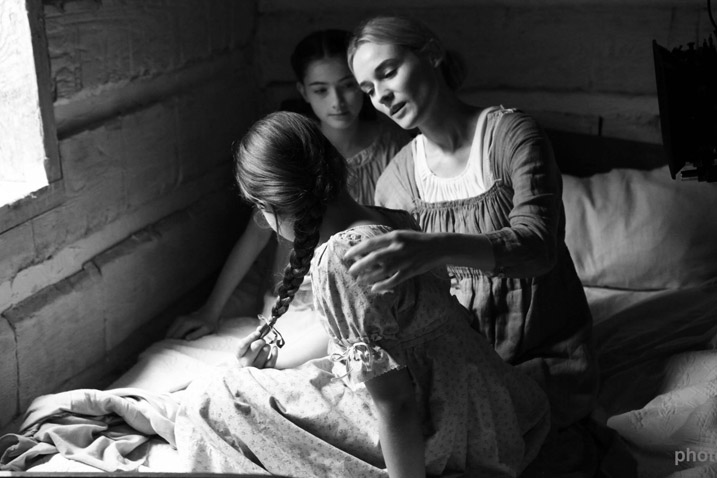 Working closely under the tutelage of Terrence Malick for several years now, editor and second-unit director turned writer/director A.J. Edwards (who has logged time on "The New World," "The Tree of Life" and "To the Wonder"), might have been better advised to get out from under the shadow of his mentor for his feature-length debut, “The Better Angels.” Instead the fledgling filmmaker is content to bask adoringly under the silhouette of his teacher to the dealbreaking detriment of his first film. Perhaps intended as loving homage, “The Better Angels” instead borders deeply on self-serious parody, virtually utilizing a checklist of every stylistic trope Edwards’ cinematic maharishi uses — hushed ponderous voice-over about the nature of life; that gliding camera; dancing wide-angle shots; jump cuts; dancing in fields; a spiritual connection to nature – and one by one employing them all without a trace of ironic self-awareness.
Working closely under the tutelage of Terrence Malick for several years now, editor and second-unit director turned writer/director A.J. Edwards (who has logged time on "The New World," "The Tree of Life" and "To the Wonder"), might have been better advised to get out from under the shadow of his mentor for his feature-length debut, “The Better Angels.” Instead the fledgling filmmaker is content to bask adoringly under the silhouette of his teacher to the dealbreaking detriment of his first film. Perhaps intended as loving homage, “The Better Angels” instead borders deeply on self-serious parody, virtually utilizing a checklist of every stylistic trope Edwards’ cinematic maharishi uses — hushed ponderous voice-over about the nature of life; that gliding camera; dancing wide-angle shots; jump cuts; dancing in fields; a spiritual connection to nature – and one by one employing them all without a trace of ironic self-awareness.
 Set in Indiana in 1817, this nature-adoring drama charts life of Abraham Lincoln as a young boy (played by newcomer Braydon Denney who barely utters a word), in a film that could alternately be called “Lincoln: Year One
Set in Indiana in 1817, this nature-adoring drama charts life of Abraham Lincoln as a young boy (played by newcomer Braydon Denney who barely utters a word), in a film that could alternately be called “Lincoln: Year One (A Malick Film).” Cared for by his divine and graceful mother (Brit Marling) and kept in line by his domineering, angry and abusive father (Jason Clarke; sensing any familiar patterns?), the young Lincoln is a quiet, but thoughtful boy who is intelligent, considerate and sensitive. Living under harsh survival-in-the-woods conditions, plague steals his mother away, but his stern father eventually finds a loving new bride and remarries (Diane Kruger). Playmates find Lincoln aloof and odd, but teachers, and one caring tutor in particular (Wes Bentley), informs the parents that the boy is extremely gifted and will grow to become a special man (something his birth mother was always intoning).
And that’s basically as much story as “The Better Angels” gives the audience, choosing instead to focus on mood, nature, divinity and celestial atmosphere like a certain filmmaker you might have heard of with the initials TM. And though “The Better Angels” is pretty to look at, giving us a sense of what a Terrence Malick film in stark and austere black and white photography might look like, Edwards’ picture has very little of its own distinctive voice or narrative thrust. Not that Edwards’ film fails because it’s short on plot – there’s certainly much bigger problems to address.
 “The Better Angels” is so tenderly imitative it soon begins to grow crushingly dull and bland. If the young grasshopper might have developed his own fighting style, he may have stood a chance, but by emulating the sensei blow for blow, our respect for the pupil diminishes minute by minute. Scored by Hanan Townshend, Malick’s go-to composer now, while the music is sonorous of its own accord, next to the all-too familiar visuals and style, they also bleed into the haze of banally appropriated elements. It all combines into a lulling feeling of familiarity, and you certainly wouldn’t be blamed if you drifted into a catnap, or were caught doing mental laundry about something (or anything) else besides what was happening on screen.
“The Better Angels” is so tenderly imitative it soon begins to grow crushingly dull and bland. If the young grasshopper might have developed his own fighting style, he may have stood a chance, but by emulating the sensei blow for blow, our respect for the pupil diminishes minute by minute. Scored by Hanan Townshend, Malick’s go-to composer now, while the music is sonorous of its own accord, next to the all-too familiar visuals and style, they also bleed into the haze of banally appropriated elements. It all combines into a lulling feeling of familiarity, and you certainly wouldn’t be blamed if you drifted into a catnap, or were caught doing mental laundry about something (or anything) else besides what was happening on screen.
Creating an exact facsimile of the master, Edwards is clearly a talented filmmaker because if certain audiences didn’t know, they’d assume his well-crafted certified copy was a Terrence Malick film without a doubt; it’s that convincingly faithful. However, that reverence to Terrence Malick is spiritually depleting and uninspired, and while “The Better Angels” might not be the worst film we’ve seen at Sundance, the manner in which it genuflects to its guru makes for one of the most unimaginative, uninvolving and derivative experiences of the festival thus far. [D+]
Browse through all our coverage of the 2014 Sundance Film Festival by clicking here.

